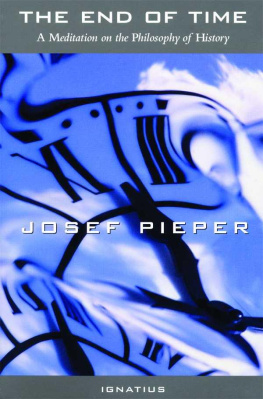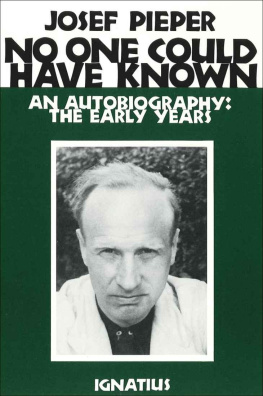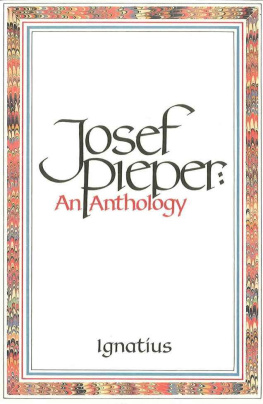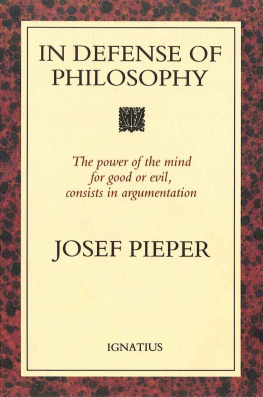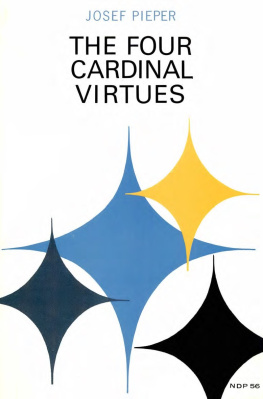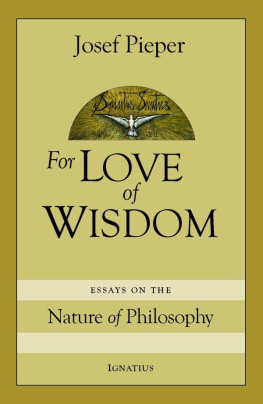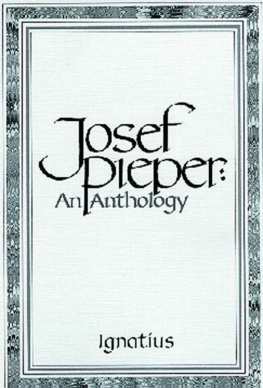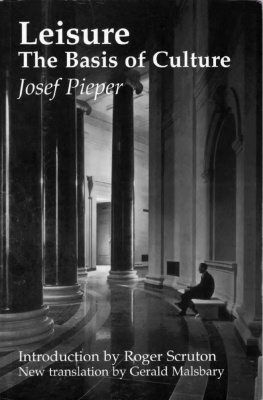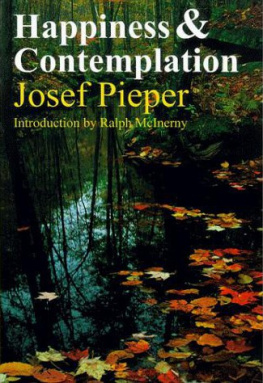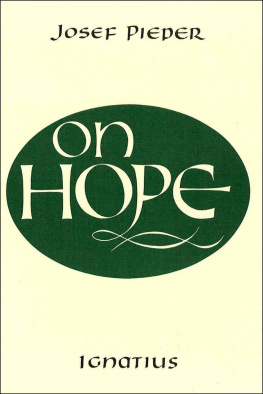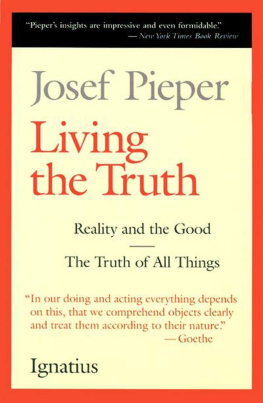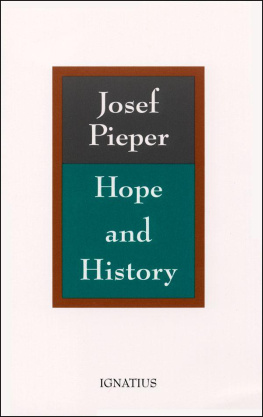Josef Pieper - The End of Time: A Meditation on the Philosophy of History
Here you can read online Josef Pieper - The End of Time: A Meditation on the Philosophy of History full text of the book (entire story) in english for free. Download pdf and epub, get meaning, cover and reviews about this ebook. year: 2017, genre: Science. Description of the work, (preface) as well as reviews are available. Best literature library LitArk.com created for fans of good reading and offers a wide selection of genres:
Romance novel
Science fiction
Adventure
Detective
Science
History
Home and family
Prose
Art
Politics
Computer
Non-fiction
Religion
Business
Children
Humor
Choose a favorite category and find really read worthwhile books. Enjoy immersion in the world of imagination, feel the emotions of the characters or learn something new for yourself, make an fascinating discovery.
- Book:The End of Time: A Meditation on the Philosophy of History
- Author:
- Genre:
- Year:2017
- Rating:4 / 5
- Favourites:Add to favourites
- Your mark:
- 80
- 1
- 2
- 3
- 4
- 5
The End of Time: A Meditation on the Philosophy of History: summary, description and annotation
We offer to read an annotation, description, summary or preface (depends on what the author of the book "The End of Time: A Meditation on the Philosophy of History" wrote himself). If you haven't found the necessary information about the book — write in the comments, we will try to find it.
The End of Time: A Meditation on the Philosophy of History — read online for free the complete book (whole text) full work
Below is the text of the book, divided by pages. System saving the place of the last page read, allows you to conveniently read the book "The End of Time: A Meditation on the Philosophy of History" online for free, without having to search again every time where you left off. Put a bookmark, and you can go to the page where you finished reading at any time.
Font size:
Interval:
Bookmark:
THE END OF TIME
JOSEF PIEPER
A Meditation on the Philosophy
of History
Translated by
Michael Bullock
IGNATIUS PRESS SAN FRANCISCO
Original German Title:
ber das Ende der Zeit:
Eine geschichtsphilosophische Betrachtung
3d, Edition 1980 by Ksel Verlag GmbH & Co., Munich
Original English edition 1954
Pantheon Books Inc., New York
All rights reserved
Reprinted with permission
Cover design by Roxanne Mei Lum
Published by Ignatius Press, San Francisco, 1999
ISBN 978-0-89870-726-7
Library of Congress catalogue number 98-74070
Printed in the United States of America
TO
ANNE BIERMANN
AND
CLEMENS MNSTER
Friends from the beginning
Who can hope to obtain proper concepts of the present, without knowing the future?
JOHANN GEORG HAMANN
The will, which is today growing even greater, to create a condition that shall hold within it an exemplarily complete essence of humanity and an enduring peace, is burdened by the heavy paradox that it is not humanity which is the goal of the Incarnation.
KONRAD WEISS
[1] The question of the end of history cannot be abandoned. [2] Is the question unanswerable? [3] The association of philosophic inquiry in general with theology. [4] This association applies above all to philosophizing concerning history. [5] A philosophy of history that is severed from theology does not perceive its subject matter. [6] What is the meaning of the return to theology? [7] The complication of philosophic thought by this return. [8] Prophecy and history. [9] The particular complication of investigation of the End, arising from the prophetic character of the theological pronouncement associated with it. [10] The special nature of the association of investigation of the End in the philosophy of history with the theological interpretation of prophecy. [11] The possibility of answering the question concerning the End on the basis of experience. [12] Credo ut intelligam . The end of philosophy.
[1] The grain of truth in nihilism. [2] There is no annihilation. [3] Man is called upon to survive the end of time. [4] How is the end of history to be conceived? [5] The presents sense of the future. [6] The inadequacy of the concepts optimism and pessimism. [7] An outline of faith in progress. [8] Kant and the philosophy of progress. [9] Fichte, Novalis, Grres. [10] The opportunity of ages of uncertainty.
[1] Contemporary man and the notion of the Antichrist. [2] Correct understanding of the Antichrist presupposes theology in toto . [3] What is the meaning of Dominion of the Antichrist? [4] The figure of the Antichrist.
Readiness for the blood-testimony and affirmation of created reality.
[1]
The question of the end of history cannot be abandoned
In history, it is not the past, not what actually happened, which is of philosophical interest. This is not what the man engaged in philosophizing wants to know, not even when his philosophizing relates specifically to history. Of course, the inquirer in the philosophy of history needs a knowledge of history (whose subject matter is necessarily the past, even when it is the most recent past that we call the present). The subject matter of inquiry in the philosophy of history, however, is different in principle from that of history itself.
If, provisionally and speaking roughly, we understand by history that happening which takes place through time, upon active and passive humanity and through its agency, then he who philosophizes, and this does not mean any professional specialistmost certainly not, it means any man who meditates upon the roots of things and lovingly seeks wisdom!he who philosophizes asks whether this historical happening means anything over and above the merely factual, and what this meaning may be. He is therefore asking a question which is by no means of the past but very much of the present, indeed, of the future: the question of what the historical process is leading up to. For the man who is spiritually existent, who is directed upon the whole of reality, in other words, for the man who philosophizes, this question of the end of history is, quite naturally, more pressing than the question of what actually happened.
It is no less natural that this question (what it is leading up to), now operative on a widening front, should attain an all the more painful topicality the more the historical happening itself shakes mans foundationsand so make it necessary, indeed, for the first time possible, for him to ask philosophical questions. Everyone is aware of the extent to which the question of the end of history is today exercising the minds of men. This results in a multiplicity of abortive answers, which win equally premature approbation and supportall of which in conjunction leads to those particular forms of sectarian apocalyptic which must be regarded as typical phenomena of the age, whose pronouncements are, for the most part, beyond discussion but which must undoubtedly be taken seriously as a symptom.
We shall, of course, do well to oppose to this kind of overheated interest in eschatological questions an especially high measure of sobriety and exactitude, indeed, the explicit renunciation of any answer. The most sober rejoinder that can be given to the question of the end of time is this: Should the question not be left alone altogether, since it is scarcely possible to answer it?
This demand presupposes that such an inquiry can simply be dropped. There is, however, a great deal to suggest that the question of the end of history cannot be suspended at all, that it will in any case be asked and, indeed, answered. This seems at least to be true of the Christian aeon, of the period post Christum natum . Aristotle was still able to hold the opinion that the process of history, like that of nature, is a cycle that continually repeats itselfso much so that, as he explicitly states, even mens opinions are identically repeated, not once or twice, not a few times, but an infinite number of times. It is no longer possible however, post Christum natum , seriously to think thus. We can omit neither the concept of the beginning, of the creation out of nothingness (nor this concept of nothingness itself, which is the truly radical one), nor the concept of the end. This, it seems to me, is to be numbered among the changes that entered into the world of man on the basis of the event revelation in Christ. To render conceivable the idea that history is not a directed happening, that it is not however manifold its stratificationa process with a beginning and an end, it would be necessary to accomplish the task, seemingly impossible, however great the will to it, of entirely abandoning the spiritual area of that tradition which has received its stamp from Christianity. Whoever says historical development has already said and thought that history possesses an irreversible direction; this applies all the more to anyone who says progress. In the most innocent use of the words already and still (the Greeks already knew,... the ancients were still aware...)such turns of phrase always contain the implication that history is leading up to something, that a particular stateof perfection or of impoverishmentis the end-state .
It therefore appears impossible to reflect upon history in a spirit of philosophical inquiry without at the same time inquiring, in some sense or other, as to the End. This question cannot be left alone.
[2]
Is the question unanswerable ?
But is it not unanswerable? In what manner can precise information ever be given in reply to the question of the issue of history, bearing in mind that it is to be philosophical information.
This immediately raises a host of fresh questions; the interrelationship is extremely intricate.
Next pageFont size:
Interval:
Bookmark:
Similar books «The End of Time: A Meditation on the Philosophy of History»
Look at similar books to The End of Time: A Meditation on the Philosophy of History. We have selected literature similar in name and meaning in the hope of providing readers with more options to find new, interesting, not yet read works.
Discussion, reviews of the book The End of Time: A Meditation on the Philosophy of History and just readers' own opinions. Leave your comments, write what you think about the work, its meaning or the main characters. Specify what exactly you liked and what you didn't like, and why you think so.

